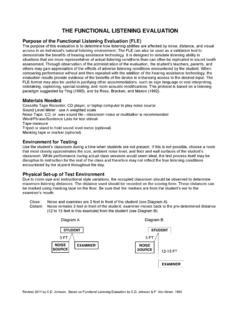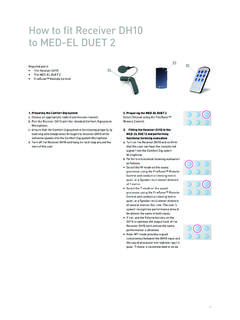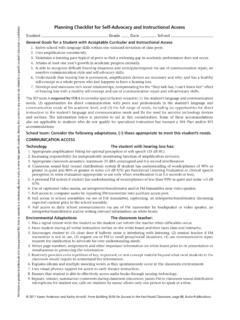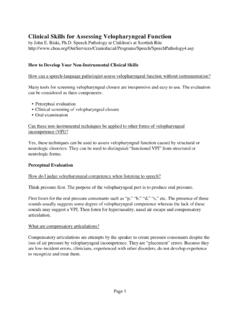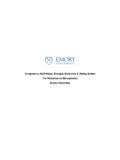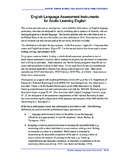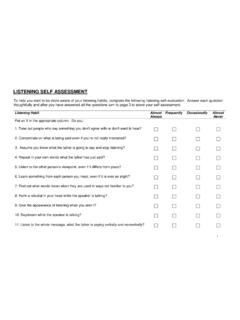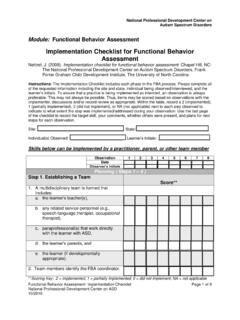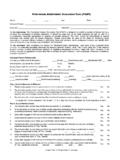Transcription of Functional Assessment of Individuals with Cognitive ...
1 Functional Assessment of Individuals with Cognitive Disabilities: A Desk Reference for Rehabilitation Michael McCue, , CRC Susan L. Chase, , CCC/SLP Carol Dowdy, Michael Pramuka, Candidate James Petrick, Sandra Aitken, , CRC Pamela Fabry, Center for Applied Neuropsychology Pittsburgh, Pennsylvania 1994 Supported, in part, through two Department of Education, Rehabilitation Service Administration grants, #H129J10012 and #H246D30003. 1 TABLE OF CONTENTSSECTION 1: Introduction and Overview .. 3 Introduction to This Handbook.
2 3 Assessment in the Context of the State-Federal Vocational Rehabilitation Process.. 5 Overview of Cognitive Disabilities ..11 The Functional Assessment Process ..14 SECTION 2: Framework for Functional Assessment ..16 Overview of a Model of Functional Assessment of Cognitive Disabilities .. 16 Cognitive Domains to be Considered..17 Vocational Impact of Cognitive Disabilities ..23A Framework for Functional Assessment ..25 SECTION 3: The Functional Assessment Process ..40 Developing Appropriate Referrals .. 40 Collecting and Utilizing Existing Information.
3 42 Pre- Assessment Dialogue .. 44 Functional Interviewing ..46 Incidental Observations .. 51 Psychological, Psychoeducational and Neuropsychological Assessment ..54 Vocational Assessment and Exploration .. 62 Simulations, Situational Assessment and Observation in the Natural Environment ..65 SECTION 4: Assessment of Cognitive Demands in the Natural Environment .. 68 Cognitive Task Analysis .. 68 Cognitive Task Demand Scale ..70 Using Existing Information Sources.. 702 SECTION 5: Suggestions for Maximizing the Utility of the Assessment Process.
4 72 Communicating the Assessment Results .. 72 Cultivating Vendors for Functional Assessment : Provider Managed Assessments..74 Shaping the Product ..75 REFERENCES ..77 APPENDIX 1: Glossary .. 80 APPENDIX 2: Case Study and Sample Report .. 88 APPENDIX 3: Test Interpretation Guide ..98 APPENDIX 4: Test Descriptions ..99 APPENDIX 5: Rating Scale of Functional Limitations .. 1153 SECTION 1: Introduction and Overview Introduction to This Handbook This handbook was created as a reference for vocational rehabilitation (VR) counselors, psychologists providing services to state VR agencies, vocational evaluators, Individuals with disabilities, and other professionals working with persons with Cognitive disabilities.
5 The handbook was supported, in part, through two Department of Education, Rehabilitation Service Administration grants, "Rehabilitation Psychology Training Program for Psychologists and Rehabilitation Professionals: Assuring Functionally Useful Assessments, (H129J10012) and Functional Assessment of Individuals with Severe Cognitive Disabilities: A National Short Term Training Project, (H246D30003)."The handbook is designed to provide background and reference materials in the area of Functional Assessment of Cognitive disabilities. The first section provides an overview, for non-VR professionals and consumers, of the vocational rehabilitation system and the legislation that governs this system.
6 General information regarding Cognitive disability types and manifestations is presented and Functional Assessment is defined and illustrated. In the second section of the handbook, a framework for understanding the Functional impact of Cognitive disabilities is presented. As a result of providing Functional Assessment services for Individuals with Cognitive disabilities, and conducting multiple training programs in the content area, it became very clear that knowledge of Assessment procedures was not sufficient to enable professionals to conduct Functional assessments and fully understand the impact of Cognitive disabilities on work and daily living.
7 Practitioners need to have a working knowledge of Cognitive domains influenced by disabilities such as learning disability and acquired brain injury. Developing an intuitive feel for the effect of Cognitive disability is a prerequisite to effectively using Functional Assessment for this population. This section presents the Cognitive domains that should be considered, an overview of the potential impact of impairments in each of the domains, and a framework for functionally evaluating vocational and everyday performance in each of seven Cognitive domains.
8 The next section of the handbook deals with the procedures utilized in Functional Assessment . These include use of existing information, Functional interviewing, incidental observation of Cognitive behaviors in informal contacts with the individual, psychological and neuropsychological testing, vocational Assessment , and simulations and observations in the natural environment. Also discussed in this section are developing appropriate referrals, pre- and post- Assessment dialogue, and reporting and communicating the results of the Functional Assessment .
9 A critical component of the Functional Assessment process is relating the Individuals ' abilities and impairments to the demands of the chosen goal and the environment in which he or she will be required to perform. In order to accomplish this, the Cognitive demands of the goal and environment must be identified. The next section deals with how to systematically assess Cognitive demands in the natural environment. Section five provides suggestions for maximizing the utility of the Assessment process in 4vocational rehabilitation, including shaping the diagnostic and testing process to be more useful, improving the counselor's Functional Assessment skills, and cultivating providers of more functionally relevant assessments for Individuals with Cognitive disabilities.
10 A glossary of common terms, a case example and sample Functional Assessment report, a list of references, and a description of tests and test score interpretation guide are among the appendices. While this handbook describes an intensive Functional Assessment process which can be completed as a whole, it is important to remember that various aspects of the process can be readily incorporated into the routine of all counselors, psychologists, therapists, and educators. Looking at obstacles to vocational or educational goals in the contexts of Cognitive domains will enhance rehabilitation and educational planning, and allow for personal growth and greater success on the part of the individual.
